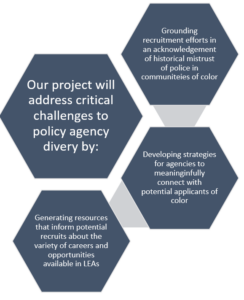ASPIRE
Advancing Science-based Policing through Inclusion, Representation, & Equity (ASPIRE): A National Campaign and Career Pathways Pilot to Promote Diversity in the Policing Workforce.
Despite some increases in diversity since the 1990s, U.S. policing largely remains a White, male profession (Wilson & Grammich, 2022). This is a product of historic, systemic discrimination that has prevented people of color and women from joining and advancing in the profession. Moreover, this lack of diversity prevents police agencies from conducting their best policework, as there is evidence that increased diversity can improve police-community relations, particularly in minority communities. For example, Hispanic and Black officers make far fewer stops and arrests and use force less than White officers, particularly against Black civilians (Ba et al., 2021). Similarly, agencies with more female officers are less likely to use excessive force or receive citizen complaints.
(Schuck & Rabe-Hemp, 2016).

RTI International, the International Association of Campus Law Enforcement Administrators (IACLEA), and the National Association of Women Law Enforcement Executives (NAWLEE) are pleased to submit our proposal to address the need to better recruit, retain, and support officers of color in American law enforcement. Our team has experience and expertise in all the areas essential to advancing this important issue: evidence-based policing; racial equity; post-secondary education and career pathways; workplace and workforce solutions (including the recruitment, retention, and support of underrepresented groups in policing); and innovative, large-scale training and technical assistance (TTA) for law enforcement. Leveraging these capabilities, we propose a project that engages law enforcement agencies (LEAs) and HBCU students and leaders to develop strategic resources that help police agencies not only diversify their staff, but also better support and engage all employees. We will develop approaches and resources that are scalable and can be adapted to assist agencies’ strategic efforts to increase the recruitment and retention of diverse officers.
This project, funded by BJA is a first of its kind collaboration.

